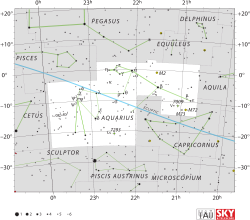天垒城十
外观
| 观测资料 历元 J2000 | |
|---|---|
| 星座 | 宝瓶座 |
| 星官 | 天垒城(虚宿) |
| 赤经 | 21h 09m 35.64888s[1] |
| 赤纬 | –11° 22′ 18.0851″[1] |
| 视星等(V) | 4.52[2] |
| 特性 | |
| 光谱分类 | G8 III[3] |
| U−B 色指数 | +0.66[2] |
| B−V 色指数 | +0.94[2] |
| 天体测定 | |
| 径向速度 (Rv) | –11.23[4] km/s |
| 自行 (μ) | 赤经:+94.12[1] mas/yr 赤纬:-14.62[1] mas/yr |
| 视差 (π) | 20.47 ± 0.21[1] mas |
| 距离 | 159 ± 2 ly (48.9 ± 0.5 pc) |
| 绝对星等 (MV) | +0.93[5] |
| 详细资料 | |
| 质量 | 2.35[5] M☉ |
| 半径 | 8[4] R☉ |
| 表面重力 (log g) | 2.8[4] |
| 亮度 | 37[4] L☉ |
| 温度 | 4,920[4] K |
| 金属量 [Fe/H] | –0.15[4] dex |
| 自转速度 (v sin i) | 0.0[4] km/s |
| 年龄 | 708[5] Myr |
| 其他命名 | |
| 参考数据库 | |
| SIMBAD | 资料 |
天垒城十(宝瓶座ν)是在天球赤道上的星座,宝瓶座的一颗恒星,拜耳名称是ν Aqr。
天垒城十的视星等为4.52等[2],是颗肉眼可见的恒星。以视差法测量它与地球的距离大约是159光年(49秒差距),估计年龄是7亿800万岁[5]。它的光谱与G8III相匹配,已经演化成为巨星 [3]。它的质量超过太阳的2倍[5],半径已经膨胀为太阳的8倍[4]。天垒城十来自有效温度4,920K的大气层表面辐射出的光量是太阳的37倍[4]。在这样的温度,这颗淡黄色的恒星是颗G-型恒星[7]。
天垒城十与女宿二(宝瓶座μ,宝瓶座6)一起被称为两只燕子(Albulaan)。这是源自阿拉伯的名称al-bulacān (ألبولعان)。它与女宿一(宝瓶座ε,宝瓶座2,Albali)和女宿二(al Bulaʽ ,البلع)都是燕子[8][9]。
在中国,天垒城是虚宿下的一个星官。其中的成员除了天垒城十外,还包括天垒城一(宝瓶座ξ,宝瓶座23)、天垒城二(摩羯座C1,摩羯座46)、天垒城三(摩羯座C2,摩羯座47)、天垒城四(摩羯座λ,摩羯座48)、天垒城五(摩羯座50)、天垒城六(宝瓶座18)、天垒城七(摩羯座29)、天垒城八(宝瓶座9)、天垒城九(宝瓶座8)、天垒城十一(宝瓶座14)、天垒城十二(宝瓶座17)、天垒城十三(宝瓶座19)[10]。因此,天垒城十的意思就是星官天垒城的第10颗星[11]。
参考资料
[编辑]- ^ 1.0 1.1 1.2 1.3 1.4 van Leeuwen, F., Validation of the new Hipparcos reduction, Astronomy and Astrophysics, November 2007, 474 (2): 653–664, Bibcode:2007A&A...474..653V, arXiv:0708.1752
 , doi:10.1051/0004-6361:20078357.
, doi:10.1051/0004-6361:20078357.
- ^ 2.0 2.1 2.2 2.3 Johnson, H. L.; et al, UBVRIJKL photometry of the bright stars, Communications of the Lunar and Planetary Laboratory, 1966, 4 (99), Bibcode:1966CoLPL...4...99J.
- ^ 3.0 3.1 Buscombe, W., Spectral classification of Southern fundamental stars, Mount Stromlo Observatory Mimeogram, 1962, 4, Bibcode:1962MtSOM...4....1B.
- ^ 4.0 4.1 4.2 4.3 4.4 4.5 4.6 4.7 4.8 Massarotti, Alessandro; et al, Rotational and Radial Velocities for a Sample of 761 HIPPARCOS Giants and the Role of Binarity, The Astronomical Journal, January 2008, 135 (1): 209–231, Bibcode:2008AJ....135..209M, doi:10.1088/0004-6256/135/1/209.
- ^ 5.0 5.1 5.2 5.3 5.4 Takeda, Yoichi; Sato, Bun'ei; Murata, Daisuke, Stellar parameters and elemental abundances of late-G giants, Publications of the Astronomical Society of Japan, August 2008, 60 (4): 781–802, Bibcode:2008PASJ...60..781T, arXiv:0805.2434
 , doi:10.1093/pasj/60.4.781.
, doi:10.1093/pasj/60.4.781.
- ^ nu. Aqr. SIMBAD. 斯特拉斯堡天文资料中心. [2012-07-02].
- ^ The Colour of Stars, Australia Telescope, Outreach and Education (Commonwealth Scientific and Industrial Research Organisation), December 21, 2004 [2012-07-02], (原始内容存档于2012-03-10).
- ^ Davis Jr., G. A., The Pronunciations, Derivations, and Meanings of a Selected List of Star Names, Popular Astronomy, October 1944, 52 (3): 12, Bibcode:1944PA.....52....8D.
- ^ Allen, R. H., Star Names: Their Lore and Meaning Reprint, New York: Dover Publications Inc: 53, 1963 [2010-12-12], ISBN 0-486-21079-0, (原始内容存档于2023-07-28).
- ^ (中文) 中国星座神话, written by 陈久金. Published by 台湾书房出版有限公司, 2005, ISBN 978-986-7332-25-7.
- ^ (中文) AEEA (Activities of Exhibition and Education in Astronomy) 天文教育资讯网 2006 年 5 月 15 日 (页面存档备份,存于互联网档案馆)

